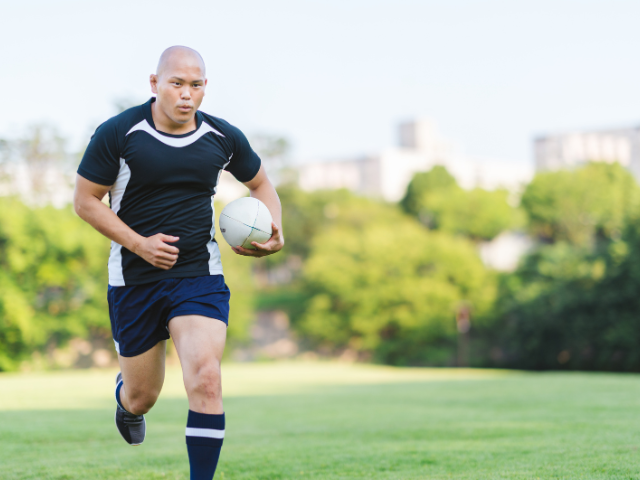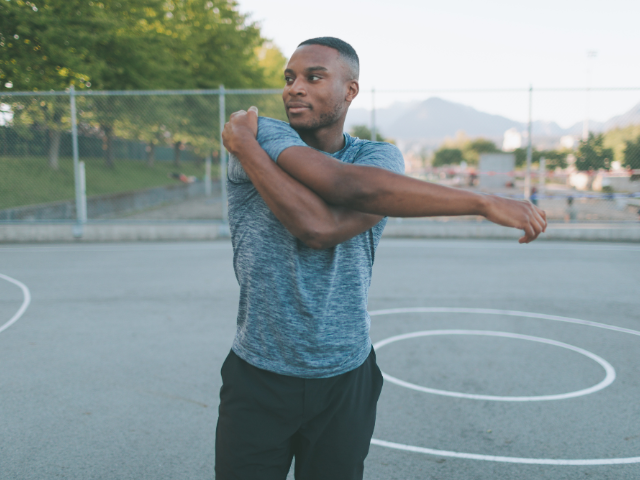Rugby Sevens is a fast-paced, high-intensity version of rugby that requires players to be in top physical condition.
Whether you’re just starting or looking to take your game to the next level, improving your fitness is crucial.
This guide will walk you through some simple and effective ways to boost your fitness for rugby sevens.
Why Fitness is Important for Rugby Sevens
Rugby Sevens is played with just seven players per team on a full-size rugby pitch.
With fewer players and shorter games, the action never stops.
Players must have a combination of speed, strength, and endurance to perform well. Fitness for rugby sevens helps you:
- Run faster on the field
- Tackle harder without getting tired
- Recover quicker after each game
- Avoid injuries by staying strong and agile
Let’s look at how you can improve your fitness to become a better Rugby Sevens player.
Cardiovascular Fitness: Building Endurance
One of the most important aspects of fitness for rugby sevens is endurance. You need to be able to run up and down the field without getting tired. Improving your cardiovascular fitness helps you keep going, even when the game gets tough.
Key Exercises:

- Running: Incorporate sprints and longer-distance runs into your training. You can alternate between short bursts of sprinting (20-30 meters) and jogging or walking for recovery. This mimics the high-intensity, stop-start nature of a rugby sevens match.
- HIIT (High-Intensity Interval Training): HIIT workouts involve short, intense exercises followed by rest. This helps build your stamina for fast-paced games. Try 30 seconds of maximum effort exercises like burpees or mountain climbers, followed by 30 seconds of rest. Repeat for 10-15 minutes.
- Cycling or Swimming: These are great alternatives to running for improving endurance while giving your joints a break.
Strength Training: Building Power
Strength is essential for tackling, pushing through defenders, and holding your ground in scrums. Rugby sevens players need to be strong, but not bulky, as mobility is key.
Key Strength Exercises:
- Squats and Deadlifts: These compound movements build strength in your legs and core, which are crucial for running and tackling. Perform these exercises with moderate to heavy weights for 3-4 sets of 8-12 reps.
- Push-Ups and Pull-Ups: Bodyweight exercises like push-ups and pull-ups are perfect for building upper body strength. Aim for 3 sets of 10-15 reps, adjusting the difficulty as needed.
- Planks and Core Work: A strong core helps you maintain balance and stability. Include exercises like planks, leg raises, and Russian twists to strengthen your midsection.
Speed Training: Getting Faster
In rugby sevens, speed is a game-changer. The ability to sprint past defenders or chase down opponents is a vital skill.
Speed training will help you become quicker off the mark and improve your overall pace.
Key Speed Exercises:
- Sprints: Practice short sprints (20-40 meters) with full effort. Focus on explosive starts, driving your knees up, and pumping your arms. Do 5-10 sprints with a rest period in between.
- Agility Drills: Use cones or a ladder to practice changing direction quickly. This will help you weave through defenders during a game. Try drills like zig-zag sprints or ladder footwork drills.
- Plyometrics: Jumping exercises like box jumps or squat jumps are great for building explosive power in your legs. Start with 3 sets of 10 jumps and focus on landing softly.
Flexibility and Mobility: Staying Injury-Free
Rugby sevens can be tough on your body, so it’s important to stay flexible and mobile to avoid injury.
Stretching and mobility exercises keep your muscles loose and improve your range of motion.
Key Flexibility and Mobility Exercises:

- Dynamic Stretching: Before games or workouts, warm up with dynamic stretches like leg swings, arm circles, and lunges to prepare your muscles for action.
- Static Stretching: After training, hold stretches for 20-30 seconds to improve flexibility. Focus on major muscle groups like your hamstrings, quads, shoulders, and back.
- Foam Rolling: Foam rolling helps relieve muscle tension and improve mobility. Roll out tight areas like your calves, thighs, and back for 5-10 minutes after training.
Recovery: Rest and Rebuild
Recovery is a crucial part of fitness for rugby sevens.
Your body needs time to rest and rebuild after intense training sessions.
Proper recovery can help you avoid burnout and reduce the risk of injury.
Key Recovery Tips:

- Get Enough Sleep: Aim for 7-9 hours of sleep each night. This is when your muscles repair and grow, allowing you to come back stronger the next day.
- Stay Hydrated: Drink plenty of water before, during, and after training to keep your body functioning at its best.
- Proper Nutrition: Eat a balanced diet with plenty of protein, carbs, and healthy fats to fuel your training. Protein helps repair muscles, while carbs provide the energy you need for tough workouts.
Example Weekly Fitness Plan for Rugby Sevens
Here’s a sample weekly training plan to help you improve your fitness for rugby sevens. You can adjust it based on your schedule and fitness level.
- Monday:
- Strength training (lower body)
- Sprint intervals (5-10 sprints of 30 meters)
- Core exercises (planks, leg raises)
- Tuesday:
- Cardiovascular training (HIIT workout for 20-30 minutes)
- Agility drills (zig-zag sprints, ladder drills)
- Wednesday:
- Rest day or light recovery (walking, swimming)
- Thursday:
- Strength training (upper body)
- Speed work (3 sets of 10 squat jumps, 5-10 sprints)
- Friday:
- Cardiovascular training (running or cycling for 30 minutes)
- Core exercises (Russian twists, bicycle crunches)
- Saturday:
- Plyometric training (box jumps, squat jumps)
- Flexibility and mobility (stretching, foam rolling)
- Sunday:
- Rest and recovery day (light stretching, hydration)
Conclusion
Improving your fitness for rugby sevens takes dedication and a well-rounded approach.
By focusing on endurance, strength, speed, flexibility, and recovery, you’ll be ready to tackle the challenges of this fast-paced game.
Remember, consistency is key. Stick to a training plan, listen to your body, and make sure you’re properly fueling yourself for success.
For more tips and information on rugby sevens, check out more of our recently published articles. Stay fit, stay strong, and enjoy the game!